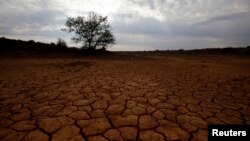Governments failed to come to a breakthrough agreement at last week's climate summit in Peru. But South African mega-brewer SAB Miller sent delegates to the talks, and says it is one of many private companies taking their own steps to fight climate change.
At this year’s climate change conference in Peru the 194 nations present failed to meet a firm agreement to cut carbon emissions. They will meet again next year in Paris in hopes of hammering out a concrete agreement.
But this year at the conference more private-industry giants said they have a large role to play in pushing for improvement, and major industry creates the bulk of the world’s greenhouse gas emissions.
The world’s second-largest beer brewer SAB Miller, which was founded in South Africa and now is based in Britain, sent delegates to this year’s climate change conference as part of a strategy to partner with governments to better care for the environment.
Vice President for Corporate Affairs for SAB Miller Peru, Felipe Cantuarias, says any climate change discussions need to include input from major industry.
“All decisions are not going to be resolved by just one government, or by NGOs or multilateral agencies working alone working alone," said Cantuarias in an interview from Lima, Peru. "I think the main request by everybody at the meeting was that this has to be addressed as a partnership working all together.”
But he acknowledged not all businesses have the same environmental interests. His company, which is also the largest Coca-Cola bottler in Africa, has a particular focus and with annual revenues of more than $23 billion, a lot is at stake.
“One of the main challenges we are facing right now is water, water scarcity. So that becomes part of our strategy," said Cantuarias. "The same with food security, all along our value chain, food security becomes a challenge for our business, and also for our communities.”
He cited projects in sub-Saharan Africa that aim at improving these issues, such as a project in Uganda to grow sorghum to make beer, reducing the need to import ingredients.
He said while this year’s climate agreement is far from perfect, progress is being made.
“And I will say in the COP 20 in Peru, even though there has been criticism about the lack of aggressive agreements, I will say that we have made progress," said Cantuarias. "I think we have moved forward some basic agreements that are critical to really start seeing some progress around, on issues like food security and on water security.”
But ultimately, he said, the fight against climate change does not rest on one government, one company, or one person, but on everyone.




